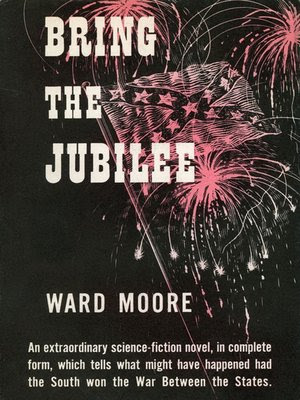As we hurdle into another election year, the term Civil War keeps popping up. It was used in explaining by the rebel Republicans ousted Kevin McCarthy, the January 6 indictments, and the Speaker of the House fiasco. I saw this as my cue to get around to reading Bring the Jubilee, Ward Moore’s classic about a universe where the South won the War Between the States. Or should I say the War of Southron Independence? Maybe there would be some insights there.
I had to keep checking the publication date. 1953. This book was not inspired by our current political predicament. The Grand Army is not based on the Proud Boys. The echoes of the current opinions expressed by various characters come out of the amazing, incredibly detailed world building. And Moore, a Northerner, didn’t seem to have a political agenda. He was fascinated by how changing one small thing could change history, and the world.
And what changes! The twentieth century is steampunkish (long before steampunk). There are air pistols and spring powered guns. Bicycles dominate the street and airships fill the sky.The North and South have not turned out as expected.
Race
relations are different: Popular
opinion was unanimous for Negro emigration to Africa, voluntary or forced;
those who went westward to join the unconquered Sioux or Nez Perce were looked
upon as depraved. Any Negro who didnt embark for Liberia or Sierra Leone,
regardless of whether he had the fare or not, deserved anything that happened
to him in the United States.
Not to mention, the United States' economy sucks. And then there’s the international situation . . .
This alternate universe is presented in disturbing detail through the eyes of a historian.
There are nonwhite characters, but they’re more like well-developed characters for our era, rather than the stereotypes common in the1950s, when publishers and readers expected “Negroes” to speak in thick dialect, so they were “authentic.”
It’s all made more impressive by how it sheds light on the recent talk of a New Civil War.
As a kid in the Sixties, I found it hard to believe that there were people who believed that the South should have won. Now I realized that it is not only true, but there are a lot of people would be happy to have the intellectual life of a medieval peasant. This book helps me deal with that disturbing reality.
It also demonstrates how fragile the course of history is, and how easily it can be changed. That gives me hope, but I do realize that the changes are hard to control, but then if you sit back, do nothing, and it gets worse, and you didn’t even try to affect it . . .
There’s that old saying about those who don’t learn from history being doomed to repeat it. Expect to hear it a lot in the near future.
They should be teaching this book in the schools, what the hell, give them something else to ban . . .




No comments:
Post a Comment